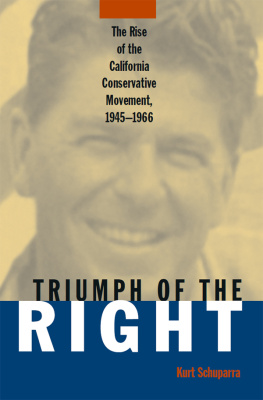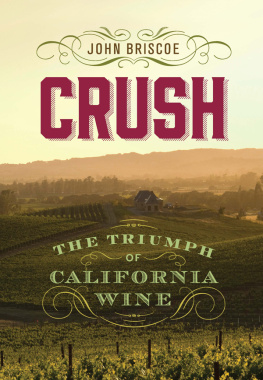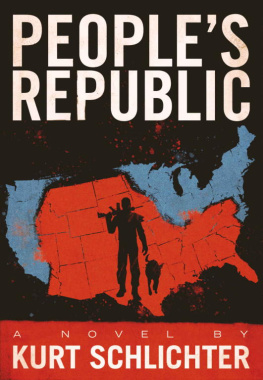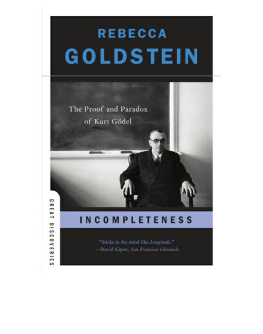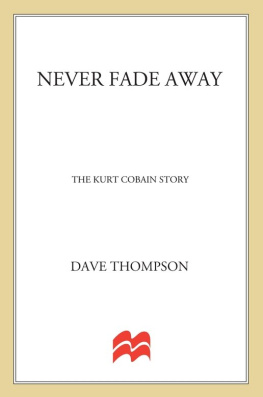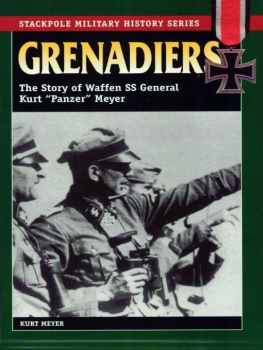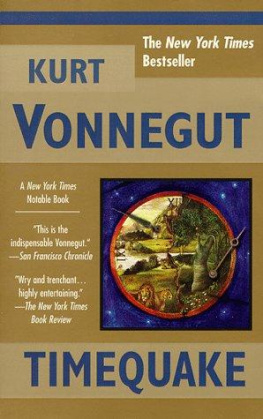TRIUMPH OF THE
RIGHT
THE RIGHT WING IN AMERICA
Glen Jeansonne, Series Editor
EXIT WITH HONOR
The Life and Presidency of Ronald Reagan
William E. Pemberton
TRIUMPH OF THE RIGHT
The Rise of the California Conservative Movement, 19451966
Kurt Schuparra
TRIUMPH OF THE
RIGHT
The Rise
of the
California
Conservative
Movement,
1945-1966
Kurt Schuparra
First published 1998 by M.E. Sharpe
Published 2015 by Routledge
2 Park Square, Milton Park, Abingdon, Oxon OX 14 4RN
711 Third Avenue, New York, NY 10017, USA
Routledge is an imprint of the Taylor & Francis Group, an informa business
Copyright 1998 Taylor & Francis. All rights reserved.
No part of this book may be reprinted or reproduced or utilised in any form or by any electronic, mechanical, or other means, now known or hereafter invented, including photocopying and recording, or in any information storage or retrieval system, without permission in writing from the publishers.
Notices
No responsibility is assumed by the publisher for any injury and/or damage to persons or property as a matter of products liability, negligence or otherwise, or from any use of operation of any methods, products, instructions or ideas contained in the material herein.
Practitioners and researchers must always rely on their own experience and knowledge in evaluating and using any information, methods, compounds, or experiments described herein. In using such information or methods they should be mindful of their own safety and the safety of others, including parties for whom they have a professional responsibility.
Product or corporate names may be trademarks or registered trademarks, and are used only for identification and explanation without intent to infringe.
Library of Congress Cataloging-in-Publication Data
Schuparra, Kurt, 1956
Triumph of the right: the rise of the California conservative movement,
19451966 / Kurt Schuparra.
p. cm.(The right wing in America)
Includes bibliographical references and index.
ISBN 0-7656-0277-6 (hardcover: alk. paper)
1. CaliforniaPolitics and government1951
2. ConservatismCaliforniaHistory20th century.
I. Title. II. Series.
F866.2.S391998
324.979493043dc2198-2897
CIP
ISBN 13: 9780765602770 (hbk)
For Fred and Ruth Schuparra
Contents
The Right has appalled and consumed historians, who have barely begun to describe and analyze it. Some of them have argued that the Right has no tradition in the United States, or that it is fueled by paranoia or a religious fervor inappropriate to politics. Others have seen it as linked closely to corporate capitalism, to a wealthy elite, to Western romantics longing for nineteenth-century rugged individualism. But the Right has always been a part of American society, whether in the mainstream, on the margins, or misunderstood. For good or ill, it has affected the course of history and warrants a rich historiography (although works on the Right sometimes are confined to obscure corners of academic bookshelves).
The M.E. Sharpe series The Right Wing in America is an attempt to resurrect the Right from the substratum of serious scholarship. By publishing biographies, studies of movements, institutions, and political, cultural, and religious developments from colonial times to the present, the series will present the Right in its variety and complexity and reveal its deep roots. Books in the series are reasonably succinct, thoroughly documented, analytical, and meant to appeal to a general audience as well as scholars and students.
Kurt Schuparras Triumph of the Right is a major reevaluation of the conservative movement that arose in California in the 1950s and rolled East. This study of California has national implications because it shows the dynamic interaction of political leaders and grassroots activists. Fair and evenhanded, Schuparra considers the right-wing Republicans neither paranoid nor unflawed. Rather, he evaluates them realistically as major players in the eras political contests.
Schuparra examines four key elections from the Republican perspective: William Knowland versus Pat Brown for governor in 1958, Richard Nixon versus Brown for governor in 1962, Ronald Reagan versus Brown for governor in 1966, and Barry Goldwater versus Nelson Rockefeller in the 1964 presidential primary. The ineffectual Knowland and the red-baiting Nixon suffered defeats. Goldwaters campaign was the first to excite conservative Californians. A macho figure, his rugged Americanism was symbolic of the Western frontier of legend. Eastern politicians, he implied, were cowardly and incapable of defending America against communism. Liberals condemned Goldwaterites as simpletons: the Right returned the insult by labeling their opponents wishy-washy. Goldwater edged Rockefeller on the strength of his vote in southern California, yet was trounced by Lyndon Johnson nationally. Goldwater in defeat, however, was John the Baptist to Ronald Reagan.
Reagan rode out of the West to the rescue of the conservative movement. In Reagan, right-wing Republicans found the long-sought balance between right-wing ideology and electability. In 1966, for the first time, a candidate once identified with the radical right was elected governor. In part, this was because Reagans congenial temperament and amiable personality disarmed critics of his views. In part, it was the result of a white middle-class backlash against anti-Vietnam demonstrators, the Great Society, and the urban riots. By 1966 the public mood had changed, and the center had shifted to the right. Reagan was both a cause and a beneficiary of this development. Schuparra shows how, beginning in the 1950s, the changes in the political environment occurred as an evolution, not as a sudden lurch. With a sure hand, Schuparra leads us through the eras tribulations with riveting personality portraits and perceptive analysis.
In the next century and the new millennium, conservatives face the prospect of revitalizing their ideology, replenishing their energy, striving to unite, and finding another charismatic torch bearer. This book is a primer and an admonition.
Glen Jeansonne
Though my name alone appears on the cover of this book, I could not have succeeded in producing this study without the help of many individuals. The special collections staff at UCLA helped me get my project under way and facilitated my effort over the long term. I was also ably assisted by the staff at the National Archives in Laguna Niguel, California and at the Freedom Center at California State University, Fullerton. Staff at the Richard Nixon Library made a diligent effort to provide me with copies of documents that they had not yet fully sorted or filed. In northern California, staff at the California State Archives, the Hoover Institute at Stanford University, and the Bancroft Library at the University of California proved very helpful as well. In particular, I wish to thank Jeff Rankin and Elliott Simon at UCLA, Laren Metzer at the California State Archives, and Gail Gutierrez at California State University, Fullerton.
I received thoughtful and constructive advice on my manuscript from Juan Garcia and Patrick Miller, and from Jack Putnam, whose knowledge of California politics proved invaluable. Many others, too numerous to mention, had an impact on the development of my study, but I am especially grateful for the helpas sounding boards and/or chapter criticsfrom Kent Anderson, Paul Carter, Matthew Dallek, Glen Jeansonne, Chris Jesperson, Kerwin Klein, and Michael Schaller. I also wish to thank the friends of mine who listened attentively and responded accordingly to my observations on American politicsprobably to a far greater extent than they ever desired. Finally, I am thankful that my family encouraged me at every step in producing this manuscript, as moral support at times proved to be the most important support of all. As for the production of the book itself, Peter Coveney, Esther Clark, and Eileen Maass of M.E. Sharpe were proficient, patient, and considerate throughout the laborious process.


